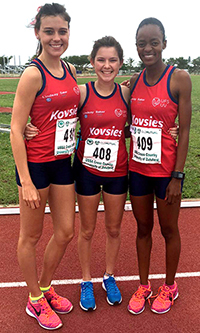
The Kovsies 8 km women’s team
was crowned as champions at
the USSA cross-country meeting
in Richards Bay. From the left are
Marne Mentz, Lizandre Mulder,
and Kesa Molotsane.
Photo: Sarina Cronje
The University of the Free State (UFS) not only boasts a South African women’s cross-country champion, one of its women’s teams is also the best university team in the country.
The Kovsies 8 km women’s team was crowned the winners at the University Sports SA cross-country event in Richards Bay, while the 10 km men’s team finished second.
Kovsies men take second place
The women’s team consisted of Kesa Molotsane, Marne Mentz, and Lizandre Mulder. They respectively came in first, third and fifth at the USSA meeting held at the University of Zululand on 30 September and 1 October 2016. In the women’s competition, the times of the first three competitors are used to determine the team placements.
The UFS 4 km women’s team finished in 5th place.
The successful UFS 10 km men’s team consisted of four members from the Qwaqwa Campus – Lesedi Radebe (4th), Lebohang Miya (8th), Moorosi Semase (10th), and Lindobuhle Miya (11th). In the men’s competition, the times of the first four men in each team are taken into account.
The Kovsies 4 km men’s team finished sixth.
Molotsane’s dream year continues
Molotsane, assistant officer at KovsieSport, is experiencing a dream year. On 10 September 2016 she was crowned as national cross-country champion over 10 km when she represented the Free State in George. Mentz was third in George over 4 km.
Molotsane improved her own record in the 3 000 m at the Clover athletics meeting in Bloemfontein on 15 October 2016. Her time of 09:51.03 was much better than her previous record time of 10:03.97.
In the USSA road relay in Richards Bay on 1 October 2016, the Kovsies women’s team finished third in the 3 x 2 km relay. The men came fifth in the 4 x 4 km relay.